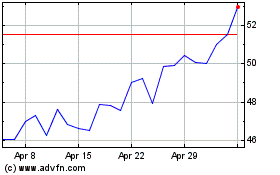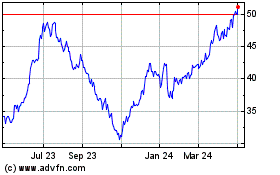Airlines Apply for Government Aid but Say Outlook Is Dire
April 03 2020 - 7:40PM
Dow Jones News
By Alison Sider and Doug Cameron
Several U.S. airlines on Friday applied for government funds to
keep paying workers, but say they still need more cash as they face
an existential crisis that doesn't look likely to abate soon.
American Airlines Group Inc., Delta Air Lines Inc., United
Airlines Holdings Inc., and JetBlue Airways Corp. submitted
applications for the government grants authorized under the $2
trillion stimulus package passed last week. Southwest Airlines Co.
has previously said it would apply.
However, carriers cautioned on Friday that the government help
won't be enough to see them through what several have described as
the most serious crisis they have faced.
The carriers that applied for the grants didn't detail the terms
they proposed. The Treasury Department had encouraged airlines to
apply by April 3 for the best chance at securing funding quickly.
It will continue accepting applications until April 27.
Demand for travel has all but evaporated as the new coronavirus
has spread and governments have restricted international travel and
urged people to stay home.
Delta Chief Executive Ed Bastian wrote in a message to employees
Friday: "We know we still haven't seen the bottom."
Delta said it is burning through $60 million cash a day and
projected the government funds would only last until June without
other spending cuts. It has asked employees to take unpaid leaves
and said some 30,000 have volunteered. The airline expects
second-quarter revenue to be down $90 million from a year ago.
JetBlue said workers will likely see smaller paychecks as the
funds, which are tied to last year's staffing levels, won't fully
cover what its employees are used to earning when the airline is
flying a full schedule. The airline said it is in talks with the
government and private lenders.
"We are leaving no stone unturned," Chief Executive Robin Hayes
told employees Friday. "The good news is this law keeps paychecks
coming and it buys us time."
United said it plans to cut 80% of its capacity for this month
and to make even larger capacity cuts in May. The airline estimated
that it lost $100 million in revenue a day in March.
Airlines and their labor unions had lobbied for that package to
include $25 billion in direct grants they could use to continue
paying staff. The funds come with strings attached, including a
promise not to conduct involuntary layoffs or furloughs until
October.
The law also allows the government to ask for equity, stock
warrants, or other financial instruments in exchange for the
grants. Some carriers have been asking Treasury Secretary Steven
Mnuchin to go easy on requests for equity stakes, fearing
shareholder dilution, people familiar with the talks have said.
Union leaders, including heads of major flight attendant unions
and three former leaders of the Air Line Pilots Association, have
said the government could put jobs at risk if it insists on terms
that the airlines won't accept.
The stimulus package also set aside another $25 billion for
loans to passenger airlines, as well as additional funds for cargo
carriers and airline contractors.
Airlines expect to continue talks with the administration about
the tentative rules laid down to access the grants, which include
minimum domestic flying requirements, as well as how the government
would be compensated through equity, warrants or other financial
instruments
Most big network carriers backed the Transportation Department's
proposals issued earlier this week, though asked for more
flexibility to avoid having to operate some seasonal services,
according to regulatory filings.
Low-cost carriers including Allegiant Travel Co. want far more
flexibility and warned the requirements could force them to fly
empty planes and risked unwinding 45 years of industry
deregulation.
Airlines have continued to raise bank and capital-market funding
through the crisis, drawing down existing loans and increasing
emergency facilities. Analysts said these would provide an
important benchmark for the security sought by the Treasury as
airline share prices have fallen by 80% since late February.
Airline shares have tumbled in recent weeks. American's shares
closed at a record low Friday, and lost most of the gains they made
since the stimulus package was announced last week.
Warren Buffett's Berkshire Hathaway sold nearly 13 million
shares of Delta this week, around 18% of its holdings, according to
a securities filing. Berkshire also sold over 2 million Southwest
shares.
While the Transportation Department prepared to analyze
potential payouts to airlines, it also told carriers on Friday to
abide by existing regulations governing cash refunds to customers.
It cited an increasing number of complaints that vouchers and
credits being offered instead of cash for canceled flights were
"not readily usable."
(END) Dow Jones Newswires
April 03, 2020 19:25 ET (23:25 GMT)
Copyright (c) 2020 Dow Jones & Company, Inc.
Delta Air Lines (NYSE:DAL)
Historical Stock Chart
From Mar 2024 to Apr 2024

Delta Air Lines (NYSE:DAL)
Historical Stock Chart
From Apr 2023 to Apr 2024
